This review originally appeared at Bitch Flicks in October 2008. With Diablo Cody set to direct her first film, it’s interesting to go back and look at the film that launched her career.
It took me a long time to see the film
Juno. I was thrilled when Diablo Cody won the Oscar for Best Screenplay, but at the same time suspicious about her little movie being so lauded. To win an Oscar, the film must be saying the “right” things to the “right” people, a dynamic that rarely favors progressive thinking (see the movie
Crash as a recent example). In other words, when too many people love a movie, there’s probably something wrong.
Aside from critical praise and popularity, the topic of teen pregnancy is rarely done without a hefty dose of morality. While we are in a peculiar cultural gray area on the subject—consider the cover of
OK Magazine, featuring
smiling teen mom Jamie Lynn Spears, or the
Republican VP nominee’s pregnant teenage daughter—there seems to be an anti-choice undercurrent running through pregnancy plots, not to mention the culture at large.
The expectations I had going in were also based on reading commentary about the ultra-hip dialogue and soundtrack of the film. While certainly not negative in themselves, coupled with a controversial topic, these features could be enough to couch a conservative, anti-woman message in a hip, fresh film.

It turns out, however, that after an initial adjustment period to the dialogue (and a question about whether the film is set in the early ‘90s),
Juno turns out to be planted in a feminist worldview, and is a film that teenagers, especially, ought to see. It was thoroughly enjoyable, funny and touching. I liked it so much that I watched it again, but when I started to write about it, what I liked about the movie became all the more confusing. I loved the music, although Juno MacGuff is way hipper than I was (or am), and I saw a representation that reminded me of myself at that age. I saw a paternal relationship that I never had and a familial openness that I’ve also never had. I saw characters who I wanted as my childhood friends and family.
And while in Juno we have a strong, unconventional female character—and a lead character, at that—the film itself was very, very safe. And I worry whether that’s a good thing. It’s certainly understandable for a first film. A Hollywood outsider would have a much more difficult time making an overtly progressive movie about teen pregnancy, but if she plays the politics safe, and if her own personality is enough of a draw, she just might make it.
I was worried when Juno visited the dumpy abortion clinic and met her pro-life classmate protesting in the parking lot, and I was worried by the very dumpiness of the clinic. I was struck by the notion that a clinic like that would look and feel much more sterile—even in the lobby, as far as Juno went. The thought of fingernails sent her running out of the building. A detail like “fingernails” made the abortion too real for Juno, a teenager, I suppose. Is this a good or bad thing? I don’t know.
Juno, in a rather nonchalant way, seeks permission of the baby’s father, her good friend Paulie Bleeker (Michael Cera), for the abortion. Or, rather, she seeks his opinion; she seems to want him to resist her plans. But his lack of resistance causes her to make the following decisions on her own. This straddles the line somewhat. She wants to be told what to do, and rather than seeking out someone smarter and more experienced than she is, she asks the boy whose approval she’s still seeking.
Juno wants her baby to have the perfect family; one unlike her own, which her mother abandoned. Her family now consists of her father, her stepmother Bren (Allison Janney), and her half-sister Liberty Bell. Juno doesn’t have a bad deal going. Her folks are markedly working class (they’re both members of the labor class, a group that doesn’t see much Hollywood recognition; he’s an HVAC repairman, she’s a nail technician). Yet Juno imagines a perfect life to consist of two loving parents and a McMansion.Why would she seek out people of this particular class? Is this a case of Juno’s lack of class awareness or the film’s?

The film’s real progressive moment comes when Juno realizes that her idea of perfection isn’t perfect. She realizes that a father who doesn’t want to be there would be as bad as a mother who hadn’t wanted to be there. She sees that a father isn’t a necessity–or perhaps simply that two parents aren’t a necessity. Yet what does this all add up to mean? There’s certainly a moment of female solidarity (and this isn’t the only one, certainly, in the film), and a difficult decision that she makes independently. But, as with other conclusions I’ve made, I’m left with the question of “So what?”
The film does love all of its characters, which is a refreshing change for a high school flick. Juno’s best friend, Leah, is a cheerleader who exhibits some flaky, teenage qualities (her crush on the chubby, bearded, middle-aged math teacher takes a cliché and gives it a twist), but the film loves her nonetheless. Vanessa Loring (Jennifer Garner) is an obsessional, middle-class mommy blogger type, but we see that she would be a good mother, and the film cares for her. We even have sympathy for Mark (Jason Bateman) who, through his relationship with Juno, realizes that he and his wife no longer want the same thing (if they ever did). There are cringe-worthy moments with Mark and Juno, but none that damn him completely. It’s a rare film that gives us no bad guys, which is a large part of its charm.
It’s easy to want to live in a world like this, where a pregnant sixteen-year-old seems to get by pretty well, with her parents’ support and a relationship with her baby’s adoptive family. She has a sweet teenage love affair and doesn’t seem to struggle much. While teen angst is the stuff of Hollywood cliché, things just seemed too easy for Juno. I wish my teenage years could’ve been a bit more like Juno’s. Hell, I wish my life now could be.
The final question remains, though, about whether we should criticize a movie like Juno. Representations of role models for American girls tend to inhabit the poles; either young girls are encouraged to be the beautiful bimbo or the chaste Christian. This film has a strong personality (that masquerades as strong values—even an ethic) without being preachy or moralistic. That can’t inherently be a bad thing. Yet I find myself asking for more, wanting more–something that steps outside of the realm of safety. Perhaps Juno isn’t the film to give me more.
In all, I fear Juno suffers from the same postmodern condition afflicting so many films today. It strives for a non-message in order not to offend anyone, thus allowing anti-choice advocates to cheer the film as loudly as pro-choice feminists. There’s a problem here. If a film that almost universally passes as hip and progressive is so murky in its values and allegiance that we’re not really sure what to think of it, how can a truly hip and progressive film make it today?

 It turns out, however, that after an initial adjustment period to the dialogue (and a question about whether the film is set in the early ‘90s), Juno turns out to be planted in a feminist worldview, and is a film that teenagers, especially, ought to see. It was thoroughly enjoyable, funny and touching. I liked it so much that I watched it again, but when I started to write about it, what I liked about the movie became all the more confusing. I loved the music, although Juno MacGuff is way hipper than I was (or am), and I saw a representation that reminded me of myself at that age. I saw a paternal relationship that I never had and a familial openness that I’ve also never had. I saw characters who I wanted as my childhood friends and family.
It turns out, however, that after an initial adjustment period to the dialogue (and a question about whether the film is set in the early ‘90s), Juno turns out to be planted in a feminist worldview, and is a film that teenagers, especially, ought to see. It was thoroughly enjoyable, funny and touching. I liked it so much that I watched it again, but when I started to write about it, what I liked about the movie became all the more confusing. I loved the music, although Juno MacGuff is way hipper than I was (or am), and I saw a representation that reminded me of myself at that age. I saw a paternal relationship that I never had and a familial openness that I’ve also never had. I saw characters who I wanted as my childhood friends and family.  The film’s real progressive moment comes when Juno realizes that her idea of perfection isn’t perfect. She realizes that a father who doesn’t want to be there would be as bad as a mother who hadn’t wanted to be there. She sees that a father isn’t a necessity–or perhaps simply that two parents aren’t a necessity. Yet what does this all add up to mean? There’s certainly a moment of female solidarity (and this isn’t the only one, certainly, in the film), and a difficult decision that she makes independently. But, as with other conclusions I’ve made, I’m left with the question of “So what?”
The film’s real progressive moment comes when Juno realizes that her idea of perfection isn’t perfect. She realizes that a father who doesn’t want to be there would be as bad as a mother who hadn’t wanted to be there. She sees that a father isn’t a necessity–or perhaps simply that two parents aren’t a necessity. Yet what does this all add up to mean? There’s certainly a moment of female solidarity (and this isn’t the only one, certainly, in the film), and a difficult decision that she makes independently. But, as with other conclusions I’ve made, I’m left with the question of “So what?”













